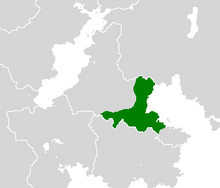User:Devink/Sandbox2: Difference between revisions
No edit summary |
No edit summary |
||
| Line 75: | Line 75: | ||
|national_anthem = | |national_anthem = | ||
|common_languages = | |common_languages = | ||
|religion = {{wp|Orthodox Christianity}} | |religion = {{wp|Orthodox Christianity}} | ||
|currency = | |currency = | ||
<!-- Titles and names of the first and last leaders and their deputies --> | <!-- Titles and names of the first and last leaders and their deputies --> | ||
| Line 135: | Line 135: | ||
For most of its history, the Grand Duchy was in a state of war against the [[Sevromark]] and was slowly pushed eastward by the latter, losing its original lands south of the Drev and in the Yug and Viz bassins, but gaining the control of the eastern coast after a serie of successful campaigns. Despite its rather large armies and the existence of a permanent tax, the administrative reliance on feudal lords and the weakness of the central government permanently shaken by court intrigues left the Grand Duchy struggling to survive, owning its success to an handful of generals acting themselves as independent rivals of the Court and thus dangers for the Dukes. | For most of its history, the Grand Duchy was in a state of war against the [[Sevromark]] and was slowly pushed eastward by the latter, losing its original lands south of the Drev and in the Yug and Viz bassins, but gaining the control of the eastern coast after a serie of successful campaigns. Despite its rather large armies and the existence of a permanent tax, the administrative reliance on feudal lords and the weakness of the central government permanently shaken by court intrigues left the Grand Duchy struggling to survive, owning its success to an handful of generals acting themselves as independent rivals of the Court and thus dangers for the Dukes. | ||
==Culture and economy== | |||
The early culture of Yugstran was characterized by a strong reaction to {{wp|iconoclasm}} with a strong development of {{wp|Icon}} and of the cult of {{wp|relic}}s. The lack of control over the Drev river also led to the isolation of the Grand Duchy until its conquest of the eastern coast. | |||
Revision as of 08:55, 29 August 2020
Grand Duchy of Yugstran Yug Nagherstran | |||||||||
|---|---|---|---|---|---|---|---|---|---|
| 1023–1919 | |||||||||
 Yugstran before the Drevstranese Civil War | |||||||||
| Status | Principality | ||||||||
| Religion | Orthodox Christianity | ||||||||
| Nagher | |||||||||
| History | |||||||||
• Ikonkivoyra | 1023 | ||||||||
| 1919 | |||||||||
| |||||||||
The Grand Duchy of Yugstran was one of the two major kingdoms fighting during the Long Ikonkivoyra. Following the murder of Havar in 1020, duke Yarvos of Yugstran became the de-facto leader of the iconudlist resistance against the Sevromark. Instead of proclaiming himself King, like his rival Karro did, Yarvos instead upgraded his realm to a "Grand" Duchy for both political and ideological reasons.
Before the Ikonkivoyra, Yugstran was considered to be a second-tier territory inside the Kingdom of the Drev, overshadowed by the Duchy of Vizstran which was the real power on the right side of the Drev river, it's dukes being the real leaders of the Iconodulists Orthodoxs.
For most of its history, the Grand Duchy was in a state of war against the Sevromark and was slowly pushed eastward by the latter, losing its original lands south of the Drev and in the Yug and Viz bassins, but gaining the control of the eastern coast after a serie of successful campaigns. Despite its rather large armies and the existence of a permanent tax, the administrative reliance on feudal lords and the weakness of the central government permanently shaken by court intrigues left the Grand Duchy struggling to survive, owning its success to an handful of generals acting themselves as independent rivals of the Court and thus dangers for the Dukes.
Culture and economy
The early culture of Yugstran was characterized by a strong reaction to iconoclasm with a strong development of Icon and of the cult of relics. The lack of control over the Drev river also led to the isolation of the Grand Duchy until its conquest of the eastern coast.